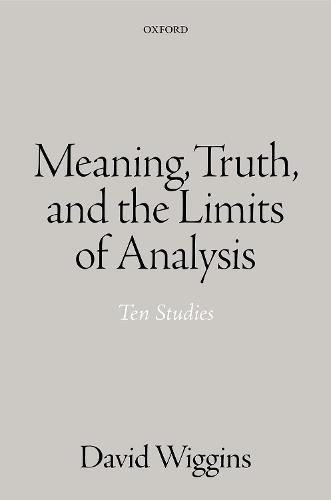Readings Newsletter
Become a Readings Member to make your shopping experience even easier.
Sign in or sign up for free!
You’re not far away from qualifying for FREE standard shipping within Australia
You’ve qualified for FREE standard shipping within Australia
The cart is loading…






This volume draws together work by David Wiggins on topics to do with language, meaning, truth, and the limit of semantic analysis, from 1980 to 2020. Each chapter draws upon previously published material, but that material has been revised, sometimes significantly, for republication here.Opening with a selective account of a century’s work in the philosophy of meaning, from Frege and Wittgenstein to the late twentieth century, the book engages first with the nuts and bolts of sentence-construction: predicates and the copula, quantifiers, names, existence treated as a second-level predicate, and adverbial modification. The following five chapters then treat of definition and (as dreamt of by Leibniz and others) the terminus of semantic analysis; the idea of natural languages as real things with a history; the idea of truth conceived as correlative with inquiry (C. S. Peirce) and, finally, the properties we look for in truth itself–the marks, as Frege or Leibniz might have said, of the concept true.
$9.00 standard shipping within Australia
FREE standard shipping within Australia for orders over $100.00
Express & International shipping calculated at checkout
This volume draws together work by David Wiggins on topics to do with language, meaning, truth, and the limit of semantic analysis, from 1980 to 2020. Each chapter draws upon previously published material, but that material has been revised, sometimes significantly, for republication here.Opening with a selective account of a century’s work in the philosophy of meaning, from Frege and Wittgenstein to the late twentieth century, the book engages first with the nuts and bolts of sentence-construction: predicates and the copula, quantifiers, names, existence treated as a second-level predicate, and adverbial modification. The following five chapters then treat of definition and (as dreamt of by Leibniz and others) the terminus of semantic analysis; the idea of natural languages as real things with a history; the idea of truth conceived as correlative with inquiry (C. S. Peirce) and, finally, the properties we look for in truth itself–the marks, as Frege or Leibniz might have said, of the concept true.